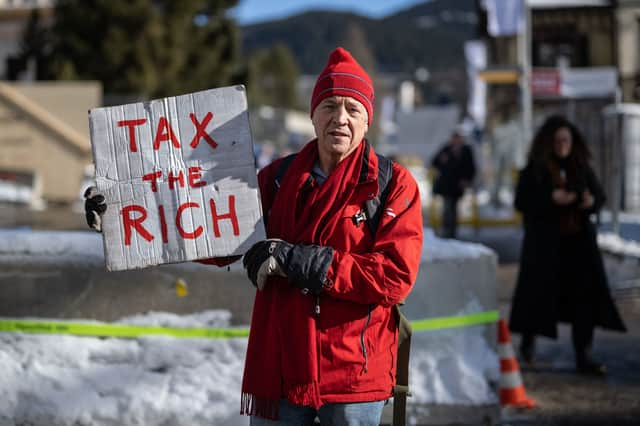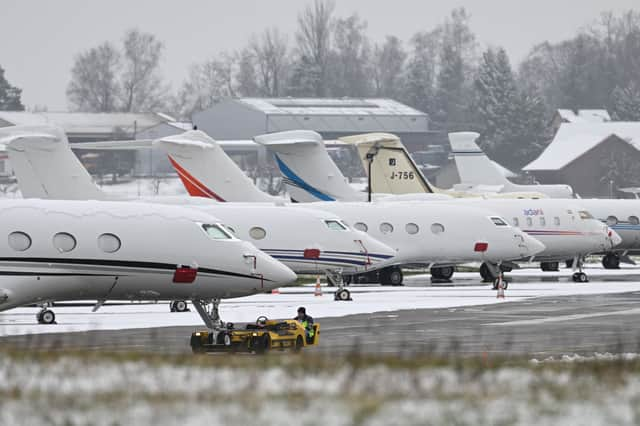Davos: I'm a millionaire and this is why I'm campaigning for the wealthy to pay more tax
This article contains affiliate links. We may earn a small commission on items purchased through this article, but that does not affect our editorial judgement.


I’ve spent this week in a snowy Davos, where the super-rich of the world meet annually in the World Economic Forum (WEF) to discuss how they think they can ‘improve the state of the world’. I’m not attending the actual forum, rather I’m here as a member of Patriotic Millionaires UK, campaigning to reduce extreme wealth inequality.
As a self-confessed wealthy individual, I have a very simple message to our government: “I can afford it, please increase my taxes, and those of people like me”. With that in mind, what better place to raise awareness of this message than here in Davos, where so many millionaires and billionaires are meeting to discuss how they might change the world.
Advertisement
Hide AdAdvertisement
Hide AdPerhaps I need to explain why I ask for my taxes to be increased at a time when most people are crying out for higher levels of income to deal with the cost of living crisis? It’s because I believe that the government can use my wealth to ease the financial burden on working people, and to create the kind of society I want to live in better than I can.
Oxfam produced a report at the beginning of the conference showing how wealth inequality has grown over the last few years. Basically it said that the rate of ‘wealth capture’ by the ultra-rich is high and increasing. It’s risen from a point where the top 1% captured half of the new wealth over the last decade, to one where they captured two-thirds of new wealth over the last two years. It’s bad and getting worse. Wealth is not creating the fair and inclusive society that we deserve, and the super-wealthy are simply accumulating more wealth.
What’s more, wealth isn’t just a financial issue. Perhaps even more important are its effects on the fabric of society. Inequality between the super-wealthy and the rest isn't something we can ignore. It has real effects that impinge on people’s lives.
Economically, wealth isn’t created out of thin air. One person's wealth is another person's inability to buy food or housing. The public sector has been devastated by years of austerity and the pandemic, and urgently needs funds, yet the wealthy who attend WEF are holding that wealth for themselves. And let’s not forget where the wealth created in the pandemic came from – it was injected by the government through furlough and subsidy schemes and ‘trickled up’ to asset owners.
Advertisement
Hide AdAdvertisement
Hide Ad

Democratically, with wealth comes power and influence. We've seen that in the UK government’s VIP fast lane for PPE procurement, and we've seen it in the revolving door between government and top industry jobs. It’s there in the UK mainstream media that people read every day, whose rich owners are able to push their particular brand of politics to millions, simply because they have wealth.
Socially, problems arise from high levels of wealth inequality. Anyone who's read The Spirit Level (and if you haven't, you should) will have been shocked by the clear correlation between wealth inequality and social ills such as crime, antisocial behaviour, drink and drug dependency and so on. When people feel they are not part of society, everyone suffers.
For all these reasons, we need to reduce wealth inequality. And that's why WEF is so important in Davos this week. It’s not that the wealthy attendees are about to take action that will ease the cost of living crisis for millions of people; it’s that the wealthy need to understand that they are inherently part of the problem.
Hence the various calls here by organisations such as Oxfam and Patriotic Millionaires for governments to tax extreme wealth. I find it deeply ironic that the WEF theme is ‘co-operation in a fragmented world’, when ultra-wealth is itself responsible for that fragmentation we see all around us.
Advertisement
Hide AdAdvertisement
Hide AdWe must reduce the role of ultra-wealth in society, and to do that we need to reduce extremes of wealth. By taxing the rich, we could take back some of the money that's trickled up to the super-rich during the pandemic and properly fund our ailing public services. In the longer term, reducing extremes of wealth would reduce divisions and make a start towards a fairer, more democratic society.
At its heart, this about our values and the kind of society we want to live in. It’s also about leaving a world fit for future generations. For that I’ll gladly pay more tax.
Phil White is a member of Patriotic Millionaires UK and The 99% Organisation
Comment Guidelines
National World encourages reader discussion on our stories. User feedback, insights and back-and-forth exchanges add a rich layer of context to reporting. Please review our Community Guidelines before commenting.